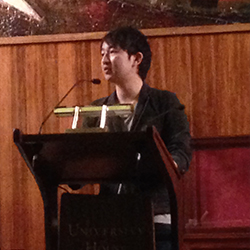
PhD (2018)
Michinao is currently an associate professor of the Graduate School of Arts and Science at the University of Tokyo.
After he obtained his Masters at the University of Tokyo, he worked at a think tank as an economist. Following this, Michinao started his PhD journey at CBE, where he was awarded a university research scholarship and HDR merit scholarship.
In 2018, Michinao completed his PhD in Economics at CBE. One year before graduating, he started working at the Bank of Japan. In 2019, he started his academic career at Tohoku University, where he still holds a visiting associate professor position.
He is currently studying sovereign debt crises and the effect of global warming on the economy. Both research projects are funded by the Japanese government or government sponsored agents.
3 SEPTEMBER 2021
Why did you choose to work in academia rather than in industry?
Throughout history, people have suffered from many crises, including natural disasters, financial crises, pandemics and conflict between nations. The motivation for my research is to provide solutions to either prevent or mitigate these crises. From this perspective, it is ideal for me to work in academia to achieve this.
However, policy suggestions based on academic research are essential not only in my field but also many other areas. For example, it is well known that good institutions play an important role in economic growth. Appropriate regulations are also necessary for low business fluctuation. I believe researchers have enormous potential to positively affect society.
What are your tips for a successful academic job application and interview?
Sun Tzu in the Art of War had noted that “if you know your enemy and know yourself, in a hundred battles you will never be defeated.” Similarly, I feel that job applicants tend to focus on themselves, but it is equivalently important to know what kind of applicants an academic institution want to hire. Jobs in academia are not only in research but also many other fields such as education, administration and policy making. Each institution has different criteria to evaluate you by so you should investigate their unique demands and demonstrate your capability accordingly.
Reflecting on your time as a PhD student, what were the biggest challenges you faced and how did you overcome them?
Stress was the biggest obstacle for me during my PhD course. As macroeconomists know very well, there are many steps to completing research projects: acquisition of basic skills and knowledge; profound understanding of prior research; finding contributions of our research; construction of economic models; coding these models; and reasonable explanations for the results based on the computer simulations. Even if we miss only one part, the research will be in vain. This made me feel very pressured to produce meaningful research outcomes. I struggled with the coding step as my code showed errors regardless of my repeated careful examinations. This was an enormous stress for me during my PhD program.
When I faced this problem, I distanced myself from coding. Generally speaking, problems usually occur in places we overlook. Therefore, I studied different things for several days and came back to the coding and often find solutions through this method.
How do you build your professional network?
I had numerous opportunities to present at conferences, and talk to researchers at them. Through our conversations, I received invites to present seminars at their universities. I was writing about sovereign debt crises at the time of my PhD program and many researchers were interested in this topic because some governments in advanced countries were accumulating massive amounts of public debts.
My advice to current PhD candidates is that your research topic needs to be interesting, even to researchers who are studying a completely different topic to you. Otherwise, your research will be regarded as narrow, and many researchers will not want to listen to you.
